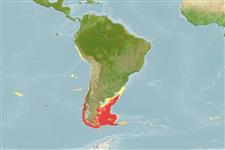أشلاق (القروش و الشفانين) (sharks and rays) >
Rajiformes (Skates and rays) >
Arhynchobatidae (Softnose skates)
Etymology: Bathyraja: Greek, bathys = deep + Latin, raja, -ae = a ray (Raja sp) (Ref. 45335).
More on author: Norman.
Environment: milieu / climate zone / depth range / distribution range
البيئة
بحري القاع. Temperate
Southeast Pacific and Southwest Atlantic: Chile (Ref. 27540), northwest of the Falkland Islands (Ref. 26282), Uruguay and Argentina (Ref. 58839).
الحجم / وزن / العمر
Maturity: Lm ? range ? - ? cm
Oviparous (Ref. 50449). Eggs have horn-like projections on the shell (Ref. 205).
Life cycle and mating behavior
Maturities | التكاثر | Spawnings | Egg(s) | Fecundities | Larvae
Oviparous, paired eggs are laid. Embryos feed solely on yolk (Ref. 50449). Eggs have horn-like projections on the shell (Ref. 205).
McEachran, J.D. and K.A. Dunn, 1998. Phylogenetic analysis of skates, a morphologically conservative clade of elasmobranchs (Chondrichthyes: Rajidae). Copeia 1998(2):271-290. (Ref. 27314)
IUCN Red List Status (Ref. 130435)
استخدامات بشرية
أدوات
تقارير خاصة
Download XML
مصادر علي الأنترنت
Estimates based on models
Preferred temperature (Ref.
123201): 3.7 - 8.9, mean 5.6 °C (based on 153 cells).
Phylogenetic diversity index (Ref.
82804): PD
50 = 0.5000 [Uniqueness, from 0.5 = low to 2.0 = high].
Bayesian length-weight: a=0.00513 (0.00253 - 0.01042), b=3.12 (2.95 - 3.29), in cm total length, based on LWR estimates for this Genus-body shape (Ref.
93245).
مستوى غذائي (Ref.
69278): 4.0 ±0.7 se; based on size and trophs of closest relatives
المرونه (Ref.
120179): منخفض, الحد الزمني الأدني لتضاعف عدد أفراد المجتمع 4.5-14 سنة (Fec assumed to be <100).
Fishing Vulnerability (Ref.
59153): High to very high vulnerability (66 of 100).
